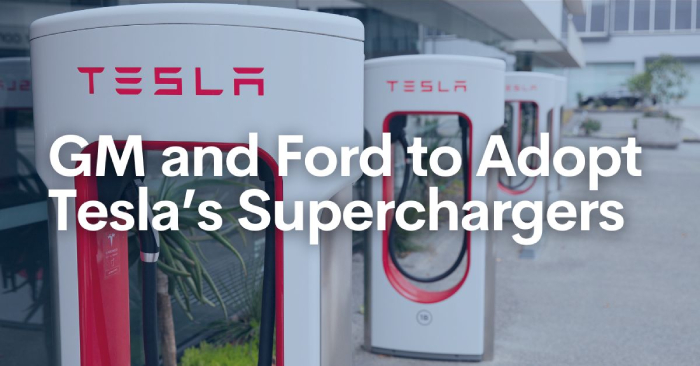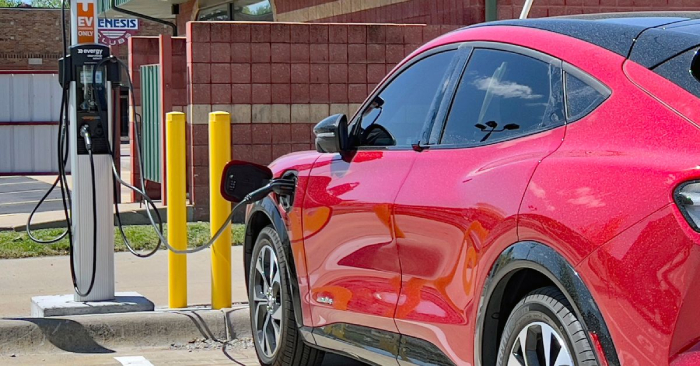Recently, Ford, General Motors and Tesla announced that GM and Ford electric vehicle owners will have the opportunity to utilize Tesla’s extensive network of fast chargers for electric vehicles, known as Superchargers.
Ford announced that its EV customers will have access to more than 12,000 Tesla Superchargers starting early 2024 and GM revealed its plans to incorporate Tesla’s charging ports, referred to as the North American Charging Standard (NACS), into their upcoming EV models beginning in 2025.
During a Twitter Spaces livestream, GM CEO Mary Barra and Tesla CEO Elon Musk revealed this collaboration, emphasizing its potential to significantly increase charger accessibility.
With Tesla’s vast network of over 12,000 Superchargers across the United States and Canada, this partnership addresses a common concern surrounding the adoption of EVs—the lack of essential charging infrastructure along US highways. This issue has gained increasing urgency, with seven states, including California and New York, passing bills to prohibit the sale of new gasoline-powered vehicles by 2035.

What is Ford’s Electric Vehicle line-up?
Here is a list of plug-in hybrid and electric vehicles currently produced by Ford Motor Company:
- Ford Mustang Mach-E
- Ford F-150 Lightning
- Ford Escape Plug-in Hybrid
- Ford Explorer Plug-in Hybrid (Availability may vary by region)
- Ford Fusion Energi (Availability may vary by region)
What is GM’s electric vehicle line-up?
These are the current plug-in hybrid and electric vehicles offered by General Motors
- Chevrolet Bolt EV
Do electric cars have less issues than other cars?
Electric cars offer several advantages over traditional internal combustion engine (ICE) cars, including fewer mechanical issues. The simpler design of electric powertrains, with fewer moving parts compared to ICE cars, contributes to their reliability. Here’s why electric cars tend to have fewer problems:
- Simpler Powertrain: Electric cars have a streamlined powertrain consisting of an electric motor, battery pack, and a few other components. This simplicity minimizes mechanical failures and reduces the need for frequent maintenance.
- Fewer Fluids and Systems: Electric cars eliminate or minimize the need for oil changes, coolant replacements, and transmission fluid services, reducing maintenance requirements and the likelihood of fluid leaks or related issues.
- Regenerative Braking: Electric cars utilize regenerative braking, which converts kinetic energy into electrical energy. This technology extends brake pad life, reduces wear on traditional friction brakes, and decreases the need for brake system repairs.
- Reduced Wear on Components: Electric motors have fewer moving parts compared to internal combustion engines, resulting in decreased wear and tear. Components prone to failure in ICE cars, such as spark plugs, timing belts, and exhaust systems, are eliminated in electric vehicles.
In comparison to regular cars, electrical issues can be particularly devastating for EVs since they rely entirely on electric power to function. Unlike traditional internal combustion engine (ICE) vehicles, which have the redundancy of multiple systems and fuel options, EVs depend solely on their electrical systems for propulsion.
Any malfunction or failure in the electrical components can lead to a complete loss of power, rendering the vehicle immobile and potentially leaving the driver stranded.
Electric cars are still relatively new to the auto industry, and long-term reliability data may vary among models and manufacturers. There appear to be challenges related to battery degradation, charging infrastructure, and software glitches. Regular maintenance, including battery health monitoring and software updates, remains crucial for optimal performance and longevity of your EV, as a regular car.
Are electric vehicles subject to Lemon Law claims?
Yes, electric vehicles (EVs) are subject to Lemon Law claims in many jurisdictions, just like any other type of vehicle. Lemon Laws are consumer protection laws that provide recourse to buyers or lessees of defective vehicles. These laws vary by jurisdiction, but they generally require manufacturers to repair or replace a defective vehicle if it meets certain criteria.
The specific criteria for a vehicle to be considered a “lemon” and eligible for Lemon Law protection can vary, but typically include factors such as the number of repair attempts or days out of service due to repairs within a specified period, often referred to as the “reasonable number of repair attempts” or “reasonable opportunity to repair.”
If an electric vehicle experiences significant recurring issues or defects that substantially impair its safety, use, or value within the parameters specified by the Lemon Law, the owner or lessee may have grounds to file a Lemon Law claim. You should consult the specific Lemon Law provisions in your jurisdiction and follow the appropriate procedures to pursue a claim.
What remedies exist for EV Lemons?
The remedies for electric vehicle (EV) lemons vary depending on the state and Lemon Law in place. Common remedies aim to provide restitution to the owner or lessee of the defective EV. Manufacturers typically have a chance to remedy recurring issues or defects through repair attempts. If unsuccessful or if problems persist, the Lemon Law may require further resolution.
In some cases, the remedy may involve a replacement vehicle. If the EV’s issues cannot be adequately resolved, the manufacturer may be obligated to replace the lemon vehicle with a new or comparable model, ensuring the consumer receives a functional vehicle without recurring defects.
A refund is another potential remedy. If the EV’s defects substantially impair safety, use, or value, the owner or lessee may be entitled to a refund covering the purchase or lease price, minus a reasonable amount for usage or mileage. Additionally, Lemon Laws may provide you with cash compensation for damages resulting from the lemon vehicle, such as rental car costs or legal fees.
Specific remedies and requirements vary by state and the applicable Lemon Law statutes in place. To understand available remedies and how to pursue them, you should consult with a Lemon Law attorney in your specific state who specializes in Lemon Law cases.

Issues with your Electric Vehicle? Contact the Lemon Law Experts
In California, consumers have lemon law protection from the Song Beverly Consumer Warranty Act. The California Lemon Law is known for providing strong consumer protections for consumers who have purchased or leased new or used vehicles that are repeatedly repaired during the warranty period.
At the Lemon Law Experts, we have a deep understanding of this law and extensive knowledge of the intricate nuances specific to EV lemon law cases. We are well-versed in the unique challenges faced by EV owners, including battery performance, range anxiety, charging infrastructure, and software-related issues.
Our team is dedicated to helping consumers navigate the complexities of the legal process and seeking appropriate remedies. We have the expertise and specialization necessary to handle cases involving defective vehicles, including EVs.
If you have any questions about your vehicle today and whether your vehicle qualifies for California Lemon Law protection, let us know by giving us a call at 877-885-5366 or by filling out a consultation form on our website.




